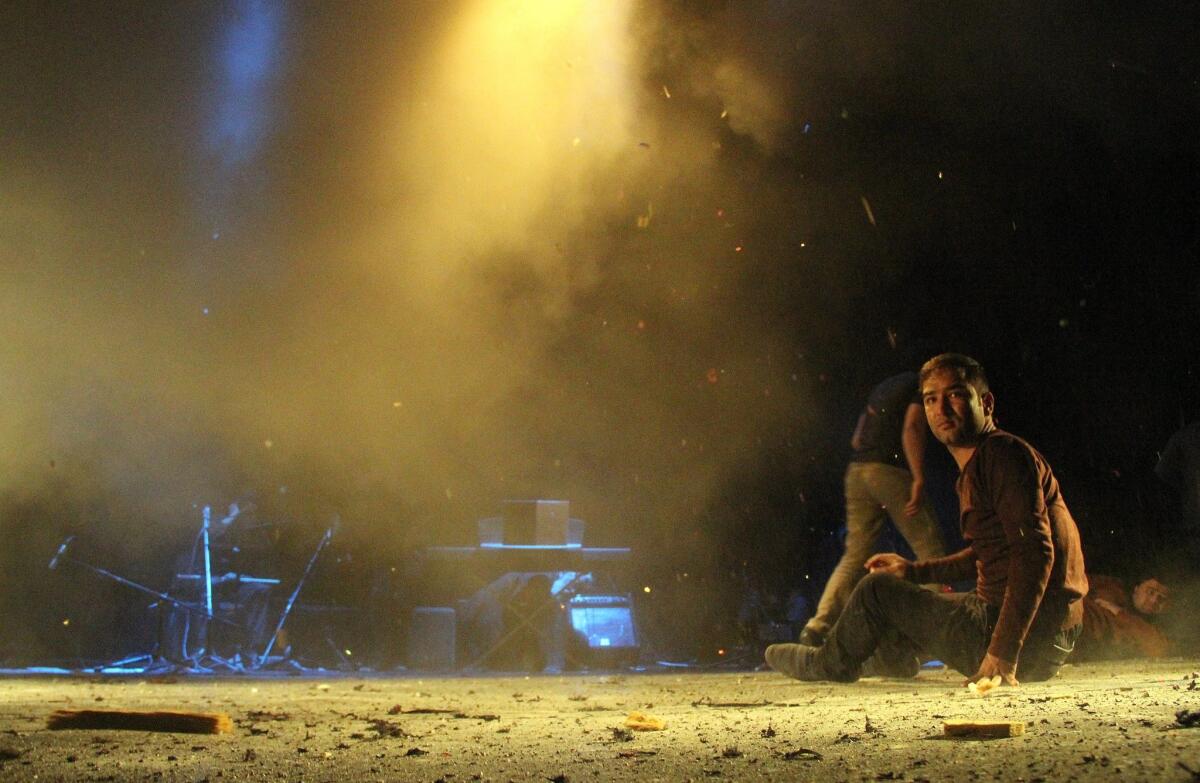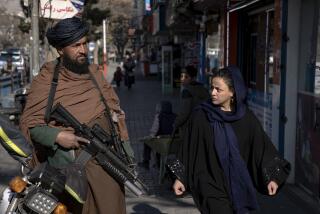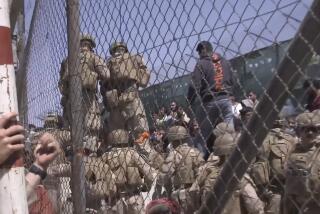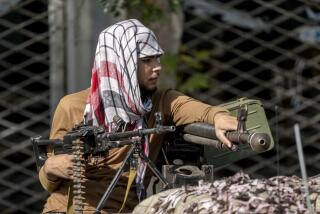Violence shakes Kabul as U.S. combat troops depart

When he arrived 40 minutes late to a play about a suicide bombing, 19-year-old Omar Haidari expected to see actors playing out the drama on stage. He didn’t imagine that he would see the remains of a real-life suicide bomber not much younger than himself.
A teenage insurgent detonated an explosives-packed vest inside the crowded auditorium, killing one person and injuring 20 others. Haidari, who was knocked unconscious by the blast, recovered in time to help rescue victims – but as he reentered the hall he saw the mangled body of the bomber splayed along a stairway.
------------
FOR THE RECORD:
Afghanistan violence: An article in the Dec. 15 Section A said that the Taliban was believed responsible for an assassination attempt on a prominent lawmaker in Afghanistan. The article failed to say that the Taliban denied responsibility for the attack. —
------------
“All I saw were pieces of his body, his clothes,” Haidari said.
The blast last Thursday was part of a sharp surge in violence in Kabul that has shaken even its most hardened residents and raised fresh concerns about Afghan security forces as most U.S. and international troops withdraw from the country.
More than two dozen bombings have undermined new President Ashraf Ghani’s plan to open negotiations with Taliban-led insurgents and shattered any hope of a clean end to the U.S.-led international combat mission. It has also demonstrated the insurgents’ staying power by defying the usual pattern of violence, which tends to decline in the cold winter months in Afghanistan.
In earlier years, the Taliban at least tried to make it seem like it avoided civilian casualties. But after the theater attack at the French-run Lycee Esteklal — a beloved high school and cultural center established almost a century ago — the insurgent group issued a statement saying it would not spare media and civil society organizations.
The play was “propaganda against the principles of Islam and our jihadi operations,” the group said, and warned that any group that presents “such anti-Islam programs will be our target” in the future.
In recent weeks, Taliban assailants are believed to have been behind the killing of a senior Supreme Court official Saturday morning, a fatal bombing of a British Embassy vehicle and an assassination attempt on a prominent lawmaker that left a young bystander dead.
The attacks are the Taliban’s way of “showing what they perceive as their strength and continued relevance,” said the lawmaker, Shukria Barakzai, who was injured in the Nov. 16 suicide bombing on her car in western Kabul.
Barakzai, a well-known lawmaker and women’s rights activist, was running late for work when her armored Toyota Land Cruiser stopped at a police checkpoint on traffic-clogged Darulaman Road. Her driver handed identification papers to a police officer who looked at them and asked, “Is Shukria Barakzai really in the car?”
“Yes, it’s me,” Barakzai said from the backseat.
The officer waved her through, but as they pulled away Barakzai saw the man pull out a Nokia cellphone and tap its keys. Moments later, a red Toyota Corolla sedan rammed into her SUV, creating an explosion that witnesses described as the loudest they had ever heard.
From her bed at the Afghan intelligence service’s hospital in Kabul, where she is being treated for burns to her face and arm, the lawmaker recalled the police officer’s suspicious behavior and wondered whether his cellphone was linked to the attempt on her life. In the past, insurgents have dressed as Afghan soldiers and police and carried out attacks.
“He started to dial someone,” said Barakzai, 41, a member of the parliament’s defense committee. “Why?”
The Taliban denied responsibility for the bombing, but to many Afghans those claims rang hollow. Barakzai was one of the insurgent group’s most vocal opponents. She strongly backed a bilateral security pact with the United States that Ghani’s government approved in September, paving the way for about 10,000 U.S. troops to remain in Afghanistan after this month to continue training and advising Afghan forces.
Barakzai complained that security forces were slow to respond to the massive blast.
“No one was there, no police, no emergency units,” she said. Finally, a journalist who came to the scene took Barakzai in her car to the hospital.
Graeme Smith, a Kabul-based analyst with the International Crisis Group, said insurgents in recent months have made inroads into two provinces bordering Kabul, Logar and Maidan Wardak, making it easier for fighters to get to the capital.
Although both provinces have long had a Taliban presence, the gains could be “starting to affect urban areas,” Smith said.
The attacks have hurt Ghani’s attempts to assert himself as the strong leader of a national unity government focused on sweeping reforms. In an angry speech Sunday, he denounced the recent attacks, saying “Enough is enough.”
Many Afghans say they will endure this, just as they have survived three decades of nearly uninterrupted war and civil strife.
“If they hope to turn Kabul into a dead city and Afghanistan into a graveyard, it’s not possible,” said Ahmad Sarmast, director of the Afghan National Institute of Music, who was injured in the theater attack.
But others say the attack robbed Kabul of one of the few safe spaces young Afghans had to learn French, watch foreign and local independent films and glimpse a life outside their war-torn homeland.
Walid Ahmadzai, who was supposed to attend the play but changed his mind at the last minute, said, “Nowhere is safe, whether it’s a mosque, a restaurant, a concert.”
Special correspondent Latifi reported from Kabul and staff writer Bengali from Mumbai, India.
For more news from Afghanistan, follow @SBengali on Twitter
More to Read
Start your day right
Sign up for Essential California for news, features and recommendations from the L.A. Times and beyond in your inbox six days a week.
You may occasionally receive promotional content from the Los Angeles Times.







